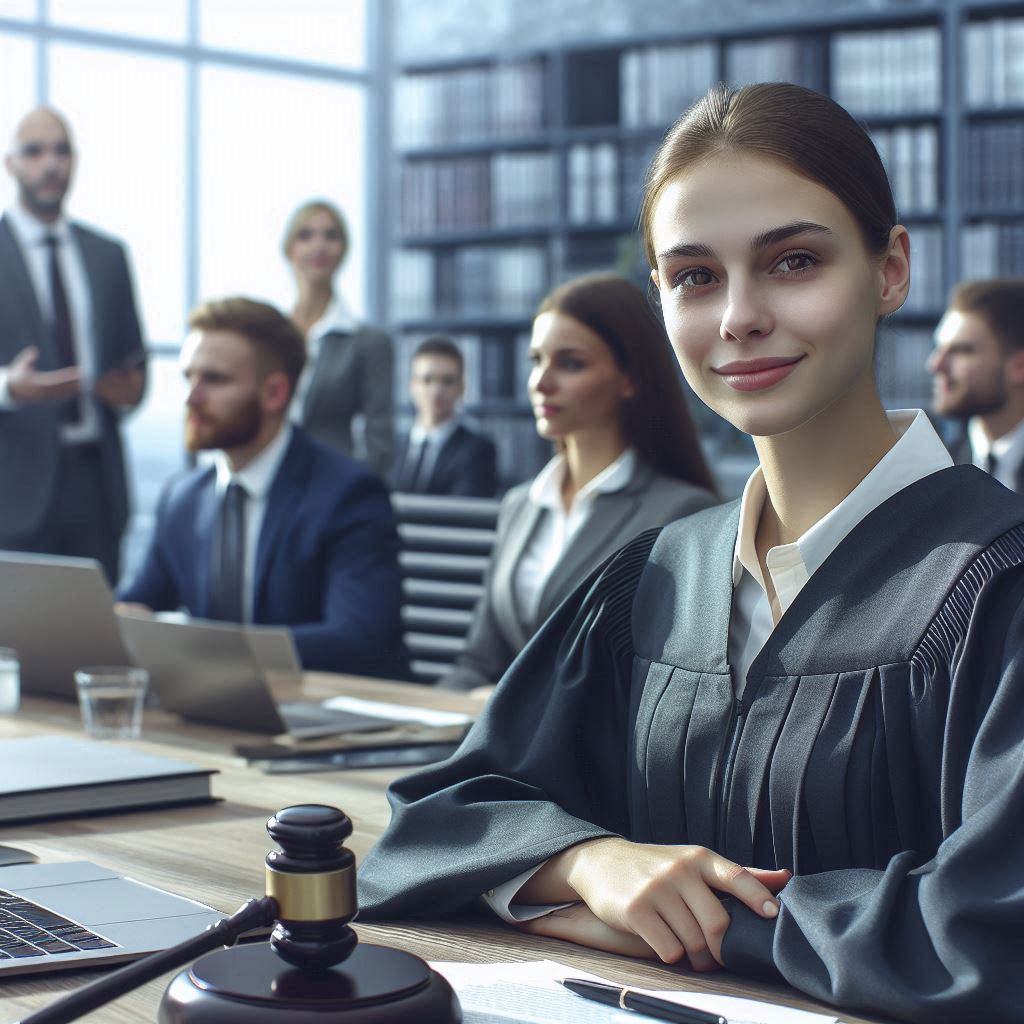Introduction
How Jury Consultants Conduct Mock Trials: Jury consultants play a crucial role in the legal system by helping attorneys understand and influence the dynamics of jury decision-making.
They provide expert analysis on jury behavior, aiding in the development of strategies to present cases more effectively.
One of the key tools in their toolkit is the mock trial, a simulated courtroom trial used to predict how real juries might react to a case.
A mock trial is a practice trial conducted before the actual court trial.
It involves presenting a case to a mock jury—typically composed of individuals who match the demographic profile of the potential real jury.
During this simulation, the attorneys present evidence and arguments as they would in a real trial.
The mock jury then deliberates and renders a verdict, providing valuable insights into how the case might be received in a real courtroom.
Mock trials are essential for several reasons.
Firstly, they offer attorneys a rehearsal space to refine their arguments and presentation style based on real-time feedback from the mock jury.
This feedback can highlight strengths and weaknesses in the case strategy, allowing for adjustments before the actual trial.
Secondly, mock trials help in jury selection by revealing the types of jurors who are most likely to be favorable or unfavorable to the case.
This information is invaluable for making informed decisions about which jurors to select or challenge during the real trial.
Finally, mock trials assist in identifying potential issues with evidence or witness testimony, enabling attorneys to address these issues before the case is presented in court.
In summary, mock trials provide a critical preview of how a case will unfold, helping attorneys to better prepare and ultimately increase their chances of success in the courtroom.
Initial Planning
Jury consultants play a crucial role in the legal system, particularly in the planning and execution of mock trials.
Before conducting a mock trial, jury consultants go through a meticulous process of initial planning to ensure that the mock trial is as close to reality as possible.
Selecting a Diverse Group of Participants
One of the first steps in planning a mock trial is selecting a diverse group of participants who can adequately represent potential jurors for the actual trial.
This diversity ensures that different perspectives and viewpoints are considered during the mock trial, making it more realistic and reflective of a real jury.
Creating a Realistic Mock Trial Scenario
Once the participants are selected, jury consultants work on creating a realistic mock trial scenario based on the actual case that will be presented in court.
This scenario includes all the relevant details, evidence, and arguments that will be used during the mock trial to simulate a courtroom setting.
Transform Your Career Today
Unlock a personalized career strategy that drives real results. Get tailored advice and a roadmap designed just for you.
Start NowDetermining Key Issues and Arguments
Jury consultants also focus on determining the key issues and arguments that will be presented during the mock trial.
By identifying these critical aspects of the case, consultants can effectively prepare the participants and anticipate the potential responses and reactions from the mock jurors.
In short, the initial planning phase for conducting mock trials is essential for jury consultants to ensure that the mock trial is a valuable and informative experience for all involved parties.
By selecting a diverse group of participants, creating a realistic scenario, and determining key issues and arguments, jury consultants can effectively simulate a courtroom setting and provide valuable insights for the actual trial.
Read: How Technology is Changing Legal Secretary Roles
Conducting Pre-Trial Research
Gathering demographic information on participants to mirror a real jury pool
Jury consultants play a crucial role in the legal process by conducting mock trials to help attorneys prepare for the real thing.
These mock trials provide valuable insights into potential juror attitudes, reactions, and biases that could affect the outcome of the case.
In order to conduct an effective mock trial, jury consultants follow a systematic process that includes pre-trial research, trial preparation, and post-trial analysis.
Before the mock trial can take place, jury consultants must gather demographic information on participants to mirror a real jury pool.
This includes factors such as age, gender, education level, occupation, and race.
By creating a diverse group of mock jurors that reflects the demographics of the community where the trial will be held, consultants can more accurately predict how a real jury might react.
Researching the case details to ensure accuracy in presenting evidence and arguments
In addition to collecting demographic data, jury consultants also research the case details to ensure accuracy in presenting evidence and arguments during the mock trial.
This involves studying the facts of the case, reviewing witness statements, and analyzing potential legal arguments.
By thoroughly understanding the case, consultants can create a realistic simulation of the trial proceedings.
Developing strategies to simulate the trial environment as closely as possible
Another important aspect of pre-trial research is developing strategies to simulate the trial environment as closely as possible.
Consultants may set up a mock courtroom, complete with a judge, attorneys, and witnesses, to recreate the atmosphere of a real trial.
This helps attorneys and clients become familiar with the courtroom setting and experience what it will be like to present their case before a jury.
Overall, conducting pre-trial research is essential for jury consultants to prepare for a mock trial effectively.
By gathering demographic information, researching the case details, and simulating the trial environment, consultants can ensure that the mock trial closely resembles the real thing.
Showcase Your Business Today
Reach thousands of readers actively exploring professional services. Publish your business profile and grow your audience now.
Publish NowThis sets the stage for a successful and insightful mock trial experience for all involved.
Read: Notable Cases Involving Jury Consultants
Setting Up the Mock Trial
Mock trials are a crucial tool for jury consultants, offering invaluable insights into how real juries might react to a case.
Setting up an effective mock trial involves several key steps.
Securing a Suitable Location
The first step in setting up a mock trial is selecting an appropriate venue.
Ideally, this should mimic a real courtroom to give participants a realistic experience.
Many consultants use conference rooms or local courthouses that can be adapted for trial simulations.
The venue should be large enough to accommodate all participants comfortably and equipped with necessary amenities, such as audio-visual equipment for presentations and recordings.
Assigning Roles
Once the location is set, the next step is assigning roles to participants.
This includes attorneys, witnesses, and jurors.
Each role must be filled by individuals who can accurately represent their respective positions.
Attorneys may include legal professionals or experienced actors skilled in courtroom performance.
Witnesses, who may be expert witnesses or laypeople, should be well-versed in the facts of the case.
Jurors are often recruited from a pool of community members or simulated jurors with diverse backgrounds to ensure a range of perspectives.
Creating a Timeline
A well-structured timeline is essential for the smooth running of the mock trial.
This schedule outlines the sequence of events, from opening statements and witness testimonies to closing arguments and deliberations.
The timeline ensures that all aspects of the trial are covered and allows for adequate time for each component.
It is crucial to adhere to this timeline to maintain the mock trial’s integrity and provide a realistic trial experience.
By carefully setting up the mock trial with these elements, jury consultants can provide valuable feedback on case strategies and potential jury responses, ultimately enhancing the preparation for the actual trial.
Read: Legal Secretary Remote Work Opportunities

Conducting the Mock Trial
Mock trials play a pivotal role in jury consulting, offering a simulated courtroom experience that aids attorneys in strategizing and refining their cases.
Here’s a step-by-step look at how jury consultants conduct these trials:
Presenting Opening Statements from Both Sides
The mock trial begins with presenting opening statements from both the plaintiff’s and defense attorneys.
This stage sets the tone and provides the jury with an overview of each side’s arguments.
Jury consultants ensure these statements are delivered clearly and persuasively, gauging how well they resonate with the mock jurors.
This phase helps in assessing the effectiveness of the arguments and the emotional impact on the jury.
Calling Witnesses to Testify and Cross-Examining Them
Following the opening statements, the trial proceeds with witness testimonies.
Consultants organize and manage this process, including the direct examination of witnesses by the attorneys and their cross-examination by opposing counsel.
The performance of witnesses is scrutinized, with consultants observing their credibility, demeanor, and the effectiveness of their testimony.
This allows attorneys to refine their questioning techniques and address any weaknesses in their witness presentations.
Allowing Attorneys to Present Evidence and Arguments
Attorneys present their evidence and arguments during the trial, showcasing documents, physical evidence, and expert testimony.
Consultants monitor how the evidence is introduced and how well it supports each side’s case.
They assess the clarity of the evidence presentation and its influence on the jury’s understanding and perception of the case.
Facilitating Jury Deliberations
The final phase involves jury deliberations. Consultants facilitate these discussions, observing the jurors’ interactions and decision-making processes.
This stage is crucial for understanding how jurors interpret the evidence and arguments presented.
Insights gained here help attorneys anticipate juror reactions and adjust their strategies accordingly.
Overall, mock trials conducted by jury consultants provide invaluable feedback, enabling attorneys to enhance their trial approaches and better prepare for the actual courtroom battle.
Read: Legal Secretary Dress Code and Etiquette
Observing and Analyzing
Mock trials are a cornerstone of jury consulting, offering valuable insights into how real jurors might perceive a case.
These simulated trials allow consultants to gauge reactions, refine arguments, and strategize for the actual courtroom.
Showcase Your Business Today
Reach thousands of readers actively exploring professional services. Publish your business profile and grow your audience now.
Publish NowObserving and analyzing participants during these trials is crucial for a successful outcome.
Observing the Participants’ Reactions and Interactions
During a mock trial, consultants closely monitor jurors’ reactions and interactions.
This includes noting how they respond to evidence, arguments, and witness testimonies.
Consultants pay attention to body language, facial expressions, and group dynamics to assess engagement and comprehension.
For instance, a juror’s nodding or frowning can indicate agreement or confusion, providing clues about the effectiveness of the presentation.
Taking Note of Biases or Prejudices Displayed
Another critical aspect is identifying any biases or prejudices that may surface.
Jurors may unconsciously reveal personal beliefs or prejudices that could affect their judgment.
Consultants observe these tendencies to understand potential obstacles and address them.
For example, if a juror shows a strong reaction to a particular piece of evidence or a witness, it might signal a bias that needs to be mitigated in the real trial.
Collecting Feedback on Argument Effectiveness
Feedback from participants is essential for refining trial strategies.
Consultants gather input on the arguments presented, asking jurors about their perceptions of credibility, persuasiveness, and overall impact.
This feedback helps in adjusting the approach, such as modifying arguments, improving presentation techniques, or re-evaluating the case strategy to enhance effectiveness in the courtroom.
In summary, jury consultants use mock trials to observe participant reactions, identify biases, and collect valuable feedback.
This thorough analysis helps in shaping a more compelling case and prepares legal teams for the complexities of a real trial.
Providing Feedback and Recommendations
After conducting a mock trial, jury consultants play a crucial role in providing valuable feedback and recommendations to the legal teams involved.
This feedback is based on a thorough analysis of various aspects of the trial and helps in refining the strategies for the actual trial.
Strengths and Weaknesses Analysis
One key aspect of the feedback provided by jury consultants is the analysis of the strengths and weaknesses of each side’s case.
Consultants examine evidence, evaluate arguments, and assess presentation to identify improvement areas or opportunities for the trial.
Suggestions for Improvement
Based on their analysis, jury consultants offer specific suggestions for improving arguments and strategies.
This could involve tweaking the messaging, refining the presentation of evidence, or strengthening the overall narrative of the case.
These recommendations are aimed at maximizing the persuasive impact on the jury.
Perception Insights
Jury consultants also provide insights on how jurors may perceive the case based on the outcomes of the mock trial.
Consultants study mock jurors’ reactions and deliberations to gauge the legal team’s approach effectiveness.
They identify and address potential pitfalls before the trial.
Jury consultants’ feedback from mock trials is invaluable.
Their recommendations help legal teams prepare for real courtroom battles.
Their expertise in analyzing case dynamics, understanding juror perceptions, and offering strategic guidance can significantly enhance the chances of success in the actual trial.
Conclusion
Mock trials are a cornerstone in the preparation process for actual court cases, offering invaluable insights and a strategic advantage to legal teams.
These simulated trials allow attorneys to test their arguments, witness performances, and overall case strategy in a controlled environment before facing a real jury.
Jury consultants play a crucial role in organizing and conducting mock trials.
Their expertise lies not only in designing the mock trial but also in creating a realistic courtroom experience.
They recruit participants resembling the anticipated jury’s demographic profile to ensure relevant and applicable feedback.
The consultant observes and analyzes the mock trial, evaluating how the mock jury receives arguments and evidence.
One of the key benefits of mock trials is the ability to receive objective feedback.
Jury consultants meticulously assess how well the case is presented, identifying strengths and weaknesses in the approach.
They offer recommendations on improving arguments, refining witness testimonies, and adjusting case strategies based on observed reactions and behaviors.
This feedback is essential for honing legal strategies and addressing potential issues before the actual trial.
In the end, mock trials are instrumental in preparing for real trials, providing a rehearsal space to test and refine legal strategies.
Jury consultants are pivotal in this process, facilitating mock trials and offering expert feedback and recommendations.
Their insights help attorneys adjust their approaches and enhance their readiness, ultimately improving their chances of success in the courtroom.
Showcase Your Business Today
Reach thousands of readers actively exploring professional services. Publish your business profile and grow your audience now.
Publish Now[E-Books for Sale]
The Big Book of 500 High-Paying Jobs in America: Unlock Your Earning Potential
$19.99 • 500 High-Paying Jobs • 330 pages
Explore 500 high-paying jobs in America and learn how to boost your career, earn more, and achieve success!
See All 500 High-Paying Jobs of this E-Book
1001 Professions Without a Degree: High-Paying American Jobs You Can Start Now
$19.99 • 1001 Professions Without a Degree • 174 pages
Discover 1001 high-paying jobs without a degree! Unlock career tips, skills, and success strategies for just $19.99!




